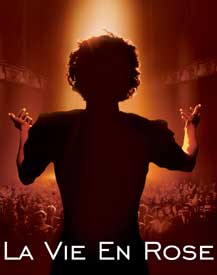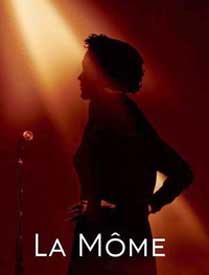 The exaggerated praise critics have had for La Vie en Rose (2007) is perhaps due to how awful cinema has become, that in contrast it only takes a crazed burlesque of sorrow to trick people into believing they've seen a serious film.
The exaggerated praise critics have had for La Vie en Rose (2007) is perhaps due to how awful cinema has become, that in contrast it only takes a crazed burlesque of sorrow to trick people into believing they've seen a serious film.
According to this film, Edith was never sober for one minute during her performing lifetime, never had happiness that wasn't delusional & quickly doomed, & experienced one miserable event after another without relent.
We get no hint of her wartime heroism, because that would not fit this falacious portrait of a selfishly self-destructive egomaniac insisting on all the wrong choices in life.
We're given to believe she was a drug addict, just as she was an alcoholic, because of her flawed personality & self-destruction, which historically is not the least bit true. In reality she became addicted to opiates after 1951 due to actual physical injuries that required pain medication.
The car accident is shown in the film, but only as one more in the endless string of flashbacks to catastrophic moments in Piaf's life, jammed so close together that after thre third or fourth one it begins to look an awful lot like gloomy slapstick.
Because the film is told in tortured flash-backs (to permit the script to skip with abandon from one tragedy to the next with nothing in between), we're not really shown that her health issues with opiates came late in life. She is simply shown to have been an alcoholic & drug addict in the context of her generally fucked up personality. And this insistance on the part of the script is malice, not biography.
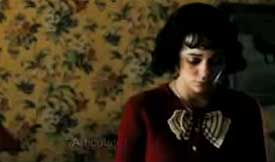 In La Vie en Rose nothing factual is permitted which made Edith out as anything but pathetic, gross, narcisistic, & strange, all the more monstrous for having a beautiful voice, like a singing diseased scab-encrusted monkey. In La Vie en Rose nothing factual is permitted which made Edith out as anything but pathetic, gross, narcisistic, & strange, all the more monstrous for having a beautiful voice, like a singing diseased scab-encrusted monkey.
We see no soldier or citizen whose life was enriched because she lived. We do see a few friends who express little more than pity. Her deep & loving friendships & relationships with the likes of Yvs Montand have to be deleted, but the great affair with the boxer is permitted because he was married to someone else & it fit right into the desire make her appear always misguided.
Her closeness to members of the Parisian community of gay artists, poets, singers, & filmmakers was completely overlooked. We do get a scene noting Cocteau wrote a play for her, but we're permitted no clue that they had a rewarding friendship, as also with gay poet Jacques Borgeat, & her close friend Maurice Chevalier. Any friend or lover who could not be portrayed in the film as a source angst & anguish of the most exaggerated kind is not permitted into the text of the film.
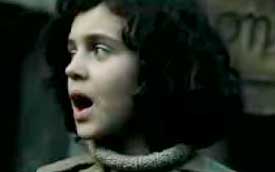 The over-the-top manic performance by Marion Cotillar makes Piaf out to be a Universal Studios style of sympathetic monster. Her performance has repeatedly evoked the descriptor "astonishing" & it most certainly is that. And the film well worth seeing for that astonishing performance. The over-the-top manic performance by Marion Cotillar makes Piaf out to be a Universal Studios style of sympathetic monster. Her performance has repeatedly evoked the descriptor "astonishing" & it most certainly is that. And the film well worth seeing for that astonishing performance.
But it's a mistake to think it's astonishing because she captures Piaf. She creates a youthful Piaf far more beautiful than ever was Piaf, & a drug-ravaged Piaf even uglier than Piaf at the end, much more on the level of the Frankenstein monster. And it absolutely is an astonishing transformation conveyed with body language & an make-up effects, in the same way it astonishes to see Lon Chaney turn from Dr. Jekyll to Mr. Hyde.
It's true Piat walked with a bizarre posture especially after 1951. But at times Cotillar has made her out to be the Hunchback of Notre Dame. The filmmakers can make credible excuses for everything they've done assaultively with Piaf's biography, but fact is they left out the good & exaggerated the bad & are left with little more than a campy terror tale flashy enough to dazzle the rubes & sell a few tickets even in America where trash more easily passes for class.
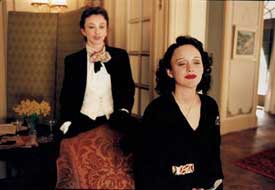 Piaf is caricatured rather than captured, a Nightmare Frog with bowling balls for eyes (on the big screen at least; on dvd I suppose they'll only look like ping pong ball eyes).
Piaf is caricatured rather than captured, a Nightmare Frog with bowling balls for eyes (on the big screen at least; on dvd I suppose they'll only look like ping pong ball eyes).
The tragedy is that for viewers who know little about Piaf, Cotillar's extraordinary creation of a blighted monstrosity probably will forever after embody for them who Piaf was.
The tragedies of her life were many & this film makes all of them into selfish events. But that wasn't the sum of her life, & by leaping so merrily from one horrific experience to another, the story becomes all too often accidentally comical, like a cartoon of dog run over by a car then torn to pieces by wild boars then eaten by gerbils, the eyeballs still blinking with surprise.
This is not to say the film can't be enjoyed. As a psychological horror tale it's great, & Cotillar's ability to go back & forth via the flashback st ructure from young nutter with a miracle voice, to ninety-nine year old balding hag who is really only in her forties, is as cool as as Lon Chaney, Jr., turning into the Wolf Man. It just doesn't happen to convey Piaf's reality.
And horror films are what it continously reminded me of. When she is visited by the "ghost" (or hallucination, who knows) of her beloved boxer Marcel Cerdan (Jean-Pierre Martins), this is orchestrated like a German expressionist horror film recombinated with a Dracula ballet, very beautiful & very weird as Piaf drifts from bedroom to kitchen to get the ghost some coffee.
So too when the child Edith sees St. Theresa in a cloud of sparks from the breath of a circus fire-eater, this was absolutely awesome. Moments like these -- the ghost's desire for coffee, the sacred light of a firebreather -- make this horror-fantasy version of Piaf's life rather thrilling indeed, no matter how void of truth.
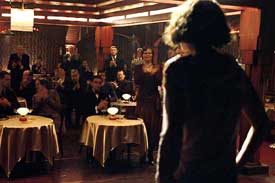 There are some side-performances that would've made the film a lot better if they weren't so synoptic. The itinerant acrobat father had scant screen time but the actor, Jean-Paul Rouve, managed to make him complex, with a pay-off in the last memory of dying Piaf that is rather grand -- if only anything else had been. There are some side-performances that would've made the film a lot better if they weren't so synoptic. The itinerant acrobat father had scant screen time but the actor, Jean-Paul Rouve, managed to make him complex, with a pay-off in the last memory of dying Piaf that is rather grand -- if only anything else had been.
Emmanuelle Seigner as Titine, the suffering prostitute who fosters then loses Edith, comes close to stealing the whole film for herself. Her side-role comes the closest to actually have been written as more than a snapshot, but even she is mostly used by the cinematographer as an artfully constructed dolly that is pretty, morbid, & goth, sufficiently articulated to be posed well.
The brothel madame who is Piaf's grandmother, as played by Catherine Allegret, provides all-knowing glances without substance. Yet she's a fine actress who makes us want to know more of her though catch more than glimpses of her. She looks so much like Simone Signoret that I was immediately drawn to her character, but the script had little time for her.
Sylvie Testud is playing Monone as though she believes she is Edith's lesbian lover, but the script never adequately admits to any such possibility, so she comes off as a character from an entirely different film than this one. Had the psychology of their bond been written sensibly it could've been profound.
Pascal Greggo as Piaf's moony manager clearly loves & pities her but comes off stiff & dormant, as do several of her ongoing companions who facilitate her addictions & poor choices then stare at her with pity which is a type of hatred. They never develop personalities of their own.
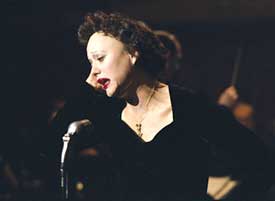 Even the "great love" with the boxer played by Jean-Pierre Martins, there's some meaningful one-sided gazes on Piaf's part, but the film is inept in conveying romance credibly, being so obsessed with burlesquing tragedy instead. Even the "great love" with the boxer played by Jean-Pierre Martins, there's some meaningful one-sided gazes on Piaf's part, but the film is inept in conveying romance credibly, being so obsessed with burlesquing tragedy instead.
Sometimes the script falls entirely to pieces. When the film's essentially over & a long death-scene is played out with harsh memories, there's a moment when Edith wants to speak of a bastard child she birthed & lost.
We're told nothing of this child until this moment at the tail-end of the story. It's tacked on as though the scriptwriter at the last minute saw in the copious notes an important monster-aspect that got left out, & just couldn't find a sensible place to insert this afterthought.
Many will adamantly disagree with my assessment of this as a great horror film but a laughable biopic. I reiterate one point: Edith's heroism during war & occupation is left out of this story because to include itwould paint a picture that would not have been malignant.
Showing Piaf's actual life would have undermined this monster flick approach. The monster the director presents, & a fascinating actress portrays, is in too many ways a conventional stereotype of woman exaggerated to outrageousness, a whining grasping selfish harridan. This simply fails to illuminate the life of the authentic Edith Piaf.
Perhaps it is impossible to approach cinamatically the subject of Piaf without getting, oh, I was going to suggest faggy or queeny. The same overwrought kitsch afflicts Edith & Marcel (Edith et Marcel, 1983), which is nevertheless a better & emotionally truer film about Piaf than is La Vie en Rose. Perhaps every twenty years or so another such faux biography will be made, praised, then forgotten. As La Vie en Rose certainly deserves to be.
copyright © by Paghat the Ratgirl
|
